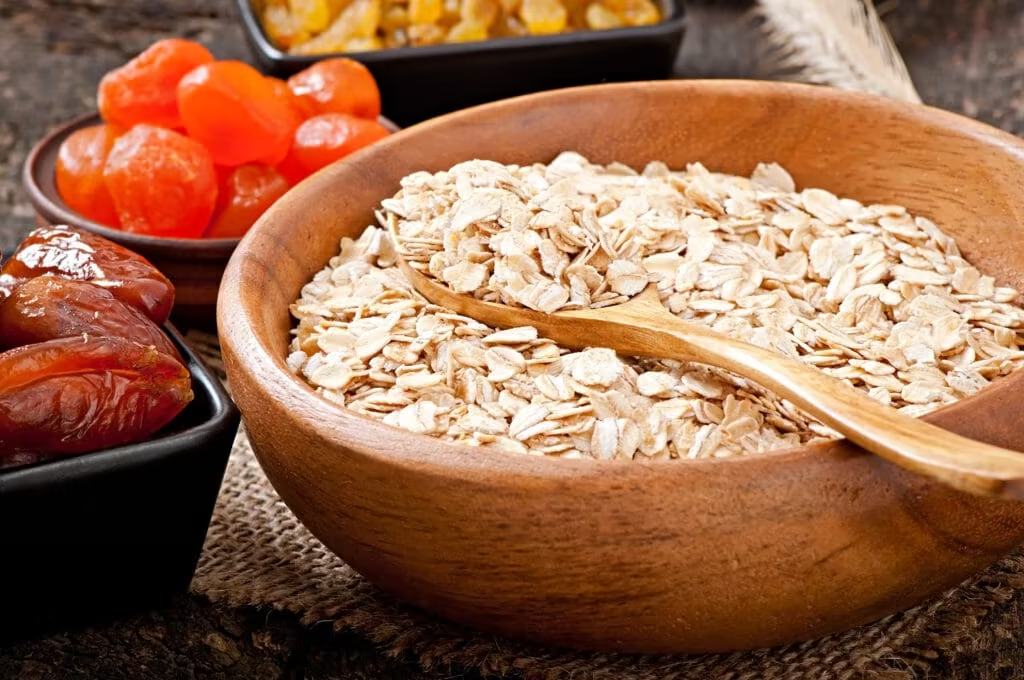Can I Eat Oatmeal Three Times a Day and Lose Weight?
This guide explores whether eating oatmeal three times a day can help with weight loss. We’ll look at oatmeal’s nutritional value, its impact on your body, and whether it’s a sustainable approach to weight management.
Table of Contents
👉 Related Read: Eat Oatmeal Three Times a Day to Lose Weight
🍏 Oatmeal’s Nutritional Profile: What’s Inside?
Oatmeal is nutrient-dense and provides several health benefits. If you want a deep dive into its benefits, check out Health Benefits of Oats and Oatmeal.
🌾 Fiber’s Role in Weight Management
Oatmeal is packed with soluble fiber, which slows digestion, helps control appetite, and reduces overall calorie intake. This is why it’s often recommended for those trying to lose weight.
Oatmeal is nutrient-dense and provides several health benefits. If you want a deep dive into its benefits, check out Health Benefits of Oats and Oatmeal.
💪 Protein Power
Oatmeal isn’t just about fiber! It also contains a decent amount of protein, which helps keep you feeling full longer and supports muscle maintenance.
🔬 How Nutrients Affect Weight
The fiber and protein in oatmeal help regulate hunger and prevent overeating. If you’re considering making oatmeal a daily habit, you might also want to explore Is Eating Oatmeal Every Day Healthy?.
🏋️♂️ Oatmeal and Weight Loss: The Science Behind It
🍽️ Feeling Full: Satiety and Oatmeal
Since oatmeal is high in fiber, it increases satiety, making you less likely to snack between meals. Research suggests that people who eat oatmeal consume fewer calories throughout the day.
🔥 Metabolism and Oatmeal
Some studies suggest that whole grains like oats can slightly boost metabolism by improving gut health and promoting fat oxidation. However, more research is needed.
👉 Want to know more about how oatmeal can be used for weight loss? Check out Oatmeal for Weight Loss.eping your blood sugar even helps with weight management. The fiber in oatmeal slows down the absorption of sugar into your bloodstream.
🍽️ Eating Oatmeal Three Times a Day: Is it Healthy?
Nutritional Benefits and Risks
Eating oatmeal three times a day sounds healthy, but it’s not a balanced diet. Oatmeal provides fiber, protein, and some vitamins and minerals. However, relying solely on oatmeal lacks many nutrients your body needs. You might miss out on important vitamins, minerals, and other beneficial substances found in fruits, vegetables, and other foods. This could lead to nutritional deficiencies.
Potential Nutrient Deficiencies
A diet based only on oatmeal might lack enough vitamin C, vitamin A, calcium, and healthy fats. These nutrients are crucial for your overall health. Vitamin C supports your immune system. Vitamin A is good for your eyes. Calcium keeps your bones strong. Healthy fats help your brain work well. Without a variety of foods, you risk health problems.
Balancing Your Diet
While oatmeal is a good food, it shouldn’t be your only food. To stay healthy, include lots of fruits, vegetables, lean proteins (like chicken or fish), and whole grains in your diet. A varied diet ensures you receive all the nutrients your body requires. Consider oatmeal as part of a balanced meal plan, not the whole plan.
Oatmeal Recipe Example
| Ingredients | Quantity | Note |
|---|---|---|
| Rolled Oats | 1/2 cup | Use quick-cooking or old-fashioned oats. |
| Water or Milk | 1 cup | Use your preference. |
| Fruit (berries, banana) | 1/4 cup | Adds sweetness and nutrients. |
| Nuts (almonds, walnuts) | A small handful | Provides healthy fats and protein. |
🍽️ Variety is Key: Different Ways to Eat Oatmeal

Sweet Oatmeal
Add fruits like berries, bananas, or apples. A drizzle of honey or maple syrup adds sweetness. Nuts and seeds give extra crunch and healthy fats.
Savory Oatmeal
Try savory oatmeal! Add things like sauteed mushrooms, spinach, or beef bacon. A sprinkle of cheese or a fried egg makes it a complete meal. A dash of vinager adds a tangy flavor.
Oatmeal with Protein
Boost your oatmeal’s protein with nuts, seeds, or Greek yogurt. Protein keeps you full longer.
Overnight Oats
Combine oats, milk (dairy or non-dairy), chia seeds, and your favorite toppings in a jar. Refrigerate overnight. Enjoy a ready-to-eat breakfast in the morning.
Baked Oatmeal
Mix oats, fruit, spices, and eggs. Bake it in the oven for a warm and comforting treat. It’s perfect for meal prep. You can add nuts and seeds for extra nutrition.
👉 If you’re a fan of oat-based treats, try this Pumpkin Oatmeal Cookies Recipe for a nutritious snack!
🥗 Creating a Balanced Diet with Oatmeal
Oatmeal in a Healthy Eating Plan
Oatmeal is a great start to a healthy day, but it shouldn’t be your only food. Think of it as one part of a bigger, balanced plan. To get all the nutrients your body needs, you need more than just oatmeal.
Adding Other Food Groups
A balanced diet includes lots of different foods. Add fruits and vegetables for vitamins and minerals. Choose lean proteins like chicken or fish. Include whole grains like brown rice or whole-wheat bread. Don’t forget healthy fats from foods like nuts and avocados.
Sample Meal Plan with Oatmeal
Here’s an example of how oatmeal fits into a healthy day:
- Breakfast: 1/2 cup oatmeal with berries and a sprinkle of nuts.
- Lunch: Salad with grilled chicken, mixed greens, and a light vinager dressing.
- Dinner: Baked salmon with roasted vegetables and brown rice.
This shows how oatmeal can be part of a balanced meal plan. It’s important to eat a variety of foods for good health.
Making Oatmeal a Part of Your Plan
Remember, variety is key. Don’t just eat plain oatmeal every day. Try different recipes and toppings. You can have sweet oatmeal with fruit or savory oatmeal with beef bacon and vegetables. The possibilities are endless! Make it fun and tasty to keep enjoying oatmeal as part of a healthy lifestyle.
🏋️♀️ Other Factors Affecting Weight Loss
Exercise and Weight Loss
Exercise is important for weight loss. It helps you burn calories and build muscle. Muscle burns more calories than fat, even when you’re resting. Aim for at least 30 minutes of moderate-intensity exercise most days of the week. This could be a brisk walk, a bike ride, or any activity you enjoy.
Sleep and Weight Management
Getting enough sleep is crucial. When you don’t sleep enough, your body produces more of the hormone ghrelin, which makes you feel hungry. It also produces less leptin, a hormone that tells your brain you’re full. Aim for 7-9 hours of quality sleep each night.
Stress and Your Weight
Stress can lead to weight gain. When you’re stressed, your body releases cortisol, a hormone that can increase appetite and fat storage. Find healthy ways to manage stress, such as yoga, meditation, or spending time in nature. These techniques can help you keep your weight in check.
🔥 Is Oatmeal a Miracle Weight-Loss Food?

Oatmeal and Weight Management: Fact vs. Fiction
Oatmeal helps with weight loss, but it’s not magic. The fiber makes you feel full, so you eat less. The protein also helps keep you satisfied. This is important because eating fewer calories is key for losing weight.
A Balanced Approach is Best
While oatmeal is good, it’s only part of a healthy plan. Eating only oatmeal will leave you missing important vitamins and minerals found in fruits, vegetables, and other foods. A balanced diet with lots of different foods is best for your health and weight. Think of oatmeal as one tool in your weight-loss toolbox, not the whole toolbox.
👩⚕️ Consulting a Professional: When to Seek Advice
Why See a Doctor or Dietitian?
Before making big changes to what you eat, it’s a good idea to talk to a doctor or a registered dietitian. This is especially important if you have any health problems. They can help you create a healthy eating plan that’s right for you.
Who Should Consult a Professional?
If you have diabetes, heart disease, or any other health condition, a doctor or dietitian can help you make sure your diet is safe and healthy. They can also help you if you’re taking medicine. Some medicines can interact with certain foods. A dietitian can help you plan meals that work well with your medications. If you’re unsure about making major diet changes, it’s always best to get professional advice. They can help you make the best choices for your health.
🎯 Conclusion: Oatmeal and Your Weight Loss Journey
Is oatmeal really good for weight loss?
Yes, oatmeal can help with weight loss. It’s high in fiber, which makes you feel full and satisfied, so you eat less. The protein in oatmeal also helps with fullness.
Can I eat only oatmeal and lose weight?
No, eating only oatmeal isn’t healthy or sustainable. Your body needs a variety of nutrients from different foods. While oatmeal is good, it’s missing many important vitamins and minerals found in fruits, vegetables, and other foods.
How much oatmeal should I eat per day?
There’s no magic number. As part of a balanced diet, 1/2 to 1 cup of oatmeal per day is a reasonable amount for most people. It’s best to make it part of a larger, healthy meal plan that includes other food groups.
What are some good ways to eat oatmeal?
You can make oatmeal sweet (with fruits and a drizzle of honey or maple syrup) or savory (with beef bacon, vegetables, and a dash of vinager). You can also add nuts, seeds, or Greek yogurt for extra protein. Experiment to find what you like!
What if I have health problems? Should I talk to a doctor or dietician before changing my diet?
Yes, it’s always a good idea to talk to a doctor or a registered dietitian before making big changes to your diet, especially if you have any health concerns. They can help you create a safe and healthy eating plan.
For more insights on making oatmeal a healthy part of your diet, explore Health Benefits of Oats and Oatmeal.

